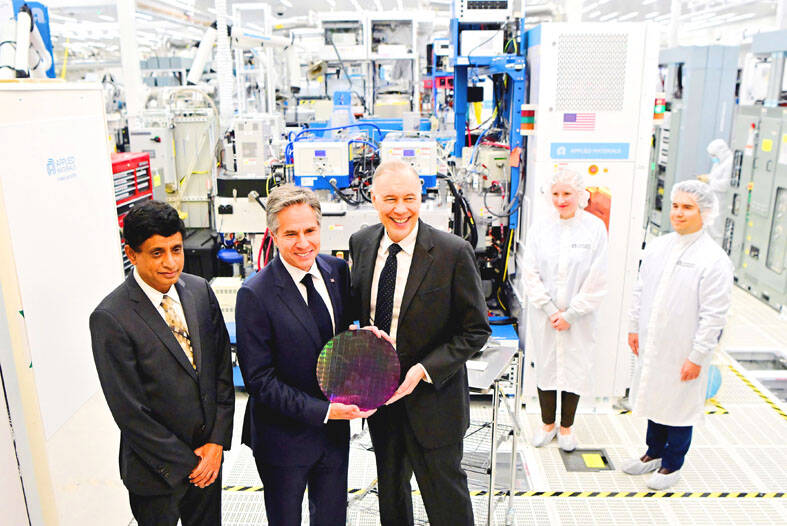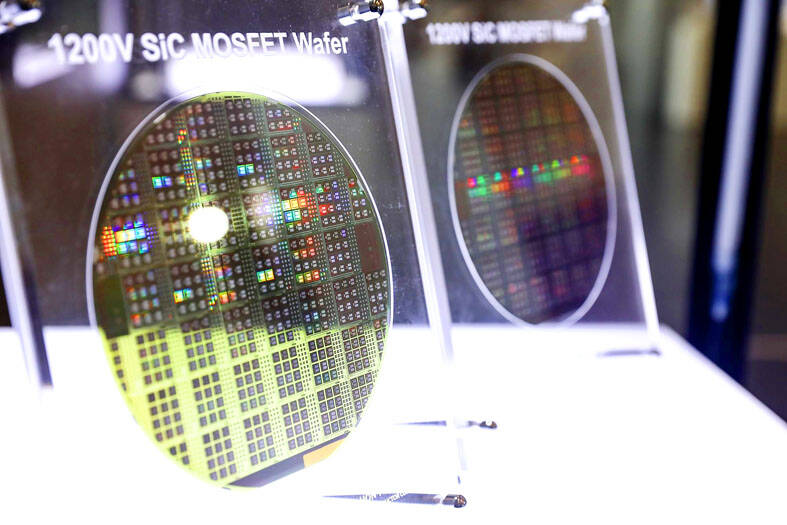Applied Materials Inc, the biggest maker of chipmaking equipment, gave a better-than-expected sales forecast for this quarter as supply chain improvements help offset an economic slowdown.
Fiscal first-quarter sales would be about US$6.7 billion, up from a year earlier, the company said in a statement on Thursday.
That compares with an average analyst estimate of US$6.34 billion.

Photo: REUTERS
The outlook brings fresh optimism that Applied Materials can weather a tumultuous stretch for the chip industry. The company, like its peers, is facing twin headwinds: a collapse in orders for some types of chips and an escalating trade conflict between China and the US.
Large customers, such as Micron Technology Inc and Intel Corp, have said they would cut budgets to cope with weaker demand.
With regard to China, Applied Materials expects to lose as much as US$2.5 billion in fiscal 2023 revenue due to new trade restrictions.

Photo: I-Hwa Cheng, Bloomberg
If the US government expedites licenses needed to sell in China, the impact could be US$1.5 billion to US$2 billion, the company said.
The outlook was reassuring enough to send Applied Materials shares up more than 2 percent in extended trading on Thursday. They earlier closed at US$104.45, leaving them down 34 percent this year.
Applied Materials CEO Gary Dickerson expressed confidence that the chipmaker could outperform the broader industry and said that untangling supply snags would help it fill more orders.
Although the economic environment is worsening, chipmakers are still spending money on new technology that can help them keep up with competitors, he said.
“That race is relentless for our customers,” he said.
Fourth-quarter earnings per share were US$2.03. Sales rose 10 percent to US$6.75 billion in the period, marking the 12th straight quarterly expansion.
Analysts predicted a profit of US$1.68 a share and revenue of US$6.38 billion.
Last month, Applied Materials slashed its forecast for the fourth quarter, warning that the new export regulations would reduce sales by about US$400 million.
The Santa Clara, California-based company projected revenue of about US$6.4 billion and said the rules would continue to weigh on its financial performance in the fiscal first quarter, ending in January.
The administration of US President Joe Biden on Oct. 7 announced additional export curbs, part of a campaign to halt China’s ability to develop the most advanced chips and equip its military.
Applied Materials and a handful of companies — US peers KLA Corp and Lam Research Corp, the Netherlands’ ASML Holding NV and Japan’s Tokyo Electron Ltd — dominate the market for machines needed to make semiconductors.
In addition to imposing rules on US companies, the administration is negotiating with European and Japanese governments to get them to do the same with their businesses.
The restrictions came at a tough time for the industry. After shortages during the COVID-19 pandemic, chipmakers had rushed to build new production.
However, companies are looking to trim their budgets. The demand for PC-related chips has fallen as customers shun big-ticket purchases, and that has weighed on chip stocks.
The Philadelphia Stock Exchange Semiconductor Index, a key benchmark, has dropped 31 percent this year.
Companies such as Applied Materials and Intel cannot easily walk away from China, which is the biggest single market for their products and part of a global supply chain for electronics.
Like other tech companies, Applied Materials is also reining in job growth.
The company is limiting hiring to “strategic positions,” it said on Thursday.

With an approval rating of just two percent, Peruvian President Dina Boluarte might be the world’s most unpopular leader, according to pollsters. Protests greeted her rise to power 29 months ago, and have marked her entire term — joined by assorted scandals, investigations, controversies and a surge in gang violence. The 63-year-old is the target of a dozen probes, including for her alleged failure to declare gifts of luxury jewels and watches, a scandal inevitably dubbed “Rolexgate.” She is also under the microscope for a two-week undeclared absence for nose surgery — which she insists was medical, not cosmetic — and is

CAUTIOUS RECOVERY: While the manufacturing sector returned to growth amid the US-China trade truce, firms remain wary as uncertainty clouds the outlook, the CIER said The local manufacturing sector returned to expansion last month, as the official purchasing managers’ index (PMI) rose 2.1 points to 51.0, driven by a temporary easing in US-China trade tensions, the Chung-Hua Institution for Economic Research (CIER, 中華經濟研究院) said yesterday. The PMI gauges the health of the manufacturing industry, with readings above 50 indicating expansion and those below 50 signaling contraction. “Firms are not as pessimistic as they were in April, but they remain far from optimistic,” CIER president Lien Hsien-ming (連賢明) said at a news conference. The full impact of US tariff decisions is unlikely to become clear until later this month

GROWING CONCERN: Some senior Trump administration officials opposed the UAE expansion over fears that another TSMC project could jeopardize its US investment Taiwan Semiconductor Manufacturing Co (TSMC, 台積電) is evaluating building an advanced production facility in the United Arab Emirates (UAE) and has discussed the possibility with officials in US President Donald Trump’s administration, people familiar with the matter said, in a potentially major bet on the Middle East that would only come to fruition with Washington’s approval. The company has had multiple meetings in the past few months with US Special Envoy to the Middle East Steve Witkoff and officials from MGX, an influential investment vehicle overseen by the UAE president’s brother, the people said. The conversations are a continuation of talks that

CHIP DUTIES: TSMC said it voiced its concerns to Washington about tariffs, telling the US commerce department that it wants ‘fair treatment’ to protect its competitiveness Taiwan Semiconductor Manufacturing Co (TSMC, 台積電) yesterday reiterated robust business prospects for this year as strong artificial intelligence (AI) chip demand from Nvidia Corp and other customers would absorb the impacts of US tariffs. “The impact of tariffs would be indirect, as the custom tax is the importers’ responsibility, not the exporters,” TSMC chairman and chief executive officer C.C. Wei (魏哲家) said at the chipmaker’s annual shareholders’ meeting in Hsinchu City. TSMC’s business could be affected if people become reluctant to buy electronics due to inflated prices, Wei said. In addition, the chipmaker has voiced its concern to the US Department of Commerce